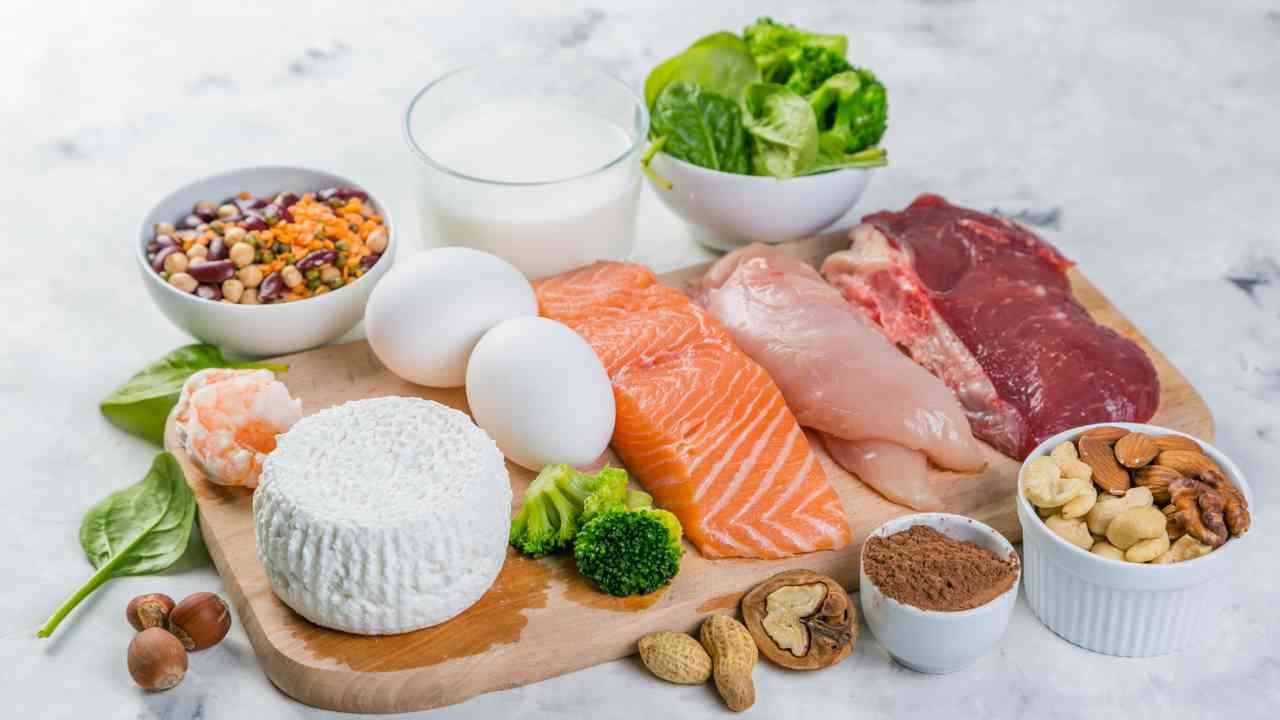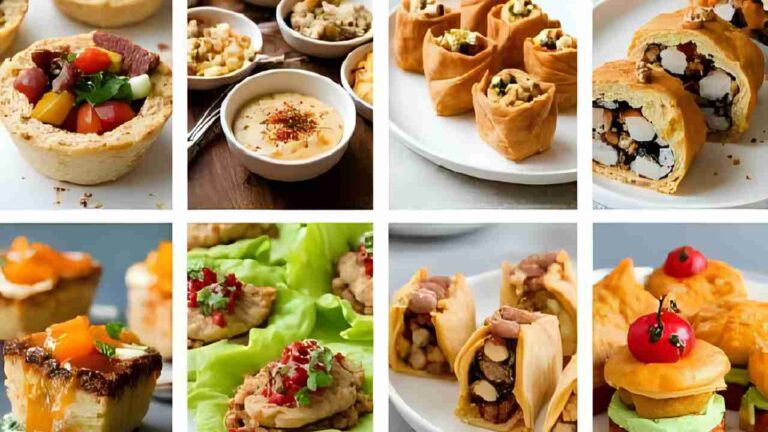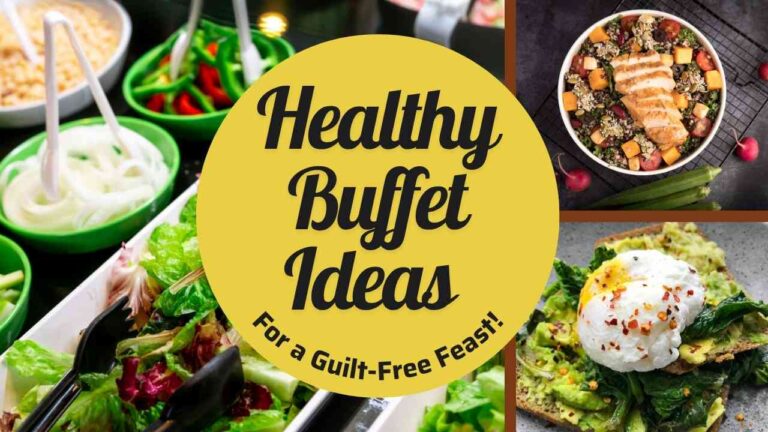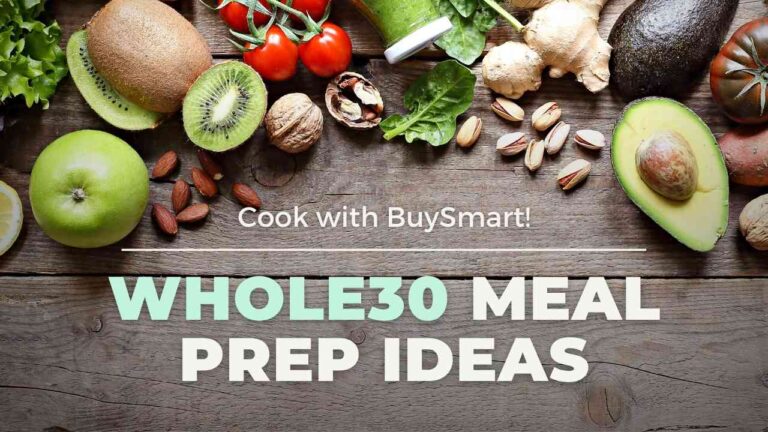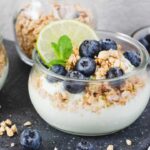Introduction
High Protein Vegetarian Recipes: Can a plant-based diet truly satisfy your protein needs and taste buds, making you forget about meat altogether? In recent years, there’s been a significant shift towards plant-based diets, with many individuals exploring vegetarian options for health, environmental, and ethical reasons.
A common concern, however, is whether a vegetarian diet can provide sufficient protein to meet daily nutritional requirements. The good news is that with thoughtful planning and a variety of high-protein vegetarian recipes, it’s entirely possible to enjoy delicious meals that are both satisfying and nutritionally adequate.
In this guide, we’ll delve into the essentials of protein in a vegetarian diet and share seven delectable recipes that might just make you forget about meat.
Key Takeaways
- A vegetarian diet can provide sufficient protein when well-balanced.
- Legumes, tofu, dairy, grains, and nuts are excellent protein sources.
- Combining different protein-rich foods ensures complete amino acid intake.
- Vegetarian meals can be delicious, easy to prepare, and highly nutritious.
- Experimenting with flavors makes plant-based eating more enjoyable!
- Top 5 High-Performing Books on Vegetarian Cooking
Understanding Protein in a Vegetarian Diet
Protein plays a crucial role in the body. It helps build and repair tissues, produces enzymes and hormones, and supports overall well-being. Many people believe that meat is the best source of protein, but plant-based foods can provide just as much—sometimes even more! A well-planned vegetarian diet can meet all protein needs without sacrificing taste or nutrition.
How Do Vegetarians Get Enough Protein?
Vegetarians can get plenty of protein by eating a mix of plant-based foods throughout the day. The key is variety. Different plants contain different amino acids, which are the building blocks of protein. By combining foods like grains, legumes, and seeds, vegetarians can ensure they are getting all the essential amino acids their body needs.
Best Plant-Based Protein Sources
A wide range of vegetarian foods is packed with protein. Let’s break it down into the best options:
1. Legumes: The Ultimate Protein Powerhouses
Legumes are one of the best sources of plant protein. They are also high in fiber, which keeps digestion healthy and helps you feel full for longer. Proteins present in 1 Cup (Cooked) of Legume are given below:-
Lentils – 18g
Chickpeas – 15g
Black Beans – 15g
Peas – 9g
Legumes are incredibly versatile. You can use them in soups, salads, stews, or even make veggie burgers with them!
2. Nuts and Seeds: Protein with Healthy Fats
Nuts and seeds are excellent sources of both protein and heart-healthy fats. They also provide essential nutrients like omega-3 fatty acids, fiber, and antioxidants. Proteins present per 1 Ounce (28g) of nuts/seeds are given below:-
Almonds – 6g
Walnuts – 4g
Chia Seeds – 5g
Hemp Seeds – 9g
A handful of almonds or a spoonful of chia seeds in a smoothie can boost your daily protein intake effortlessly.
3. Whole Grains: More Than Just Carbs
Whole grains don’t just provide energy—they also contain a surprising amount of protein! Quinoa, in particular, is a complete protein, meaning it contains all nine essential amino acids. Proteins present per 1 Cup (Cooked) of Whole Grains is given below:-
Quinoa – 8g
Brown Rice – 5g
Bulgur – 6g
Farro – 7g
Swapping refined grains for whole grains is an easy way to increase protein intake while getting more fiber and nutrients.
4. Soy Products: A Protein Source
Soy products are among the most protein-rich plant-based foods. They also provide essential minerals like calcium and iron. Proteins present per 3.5 oz (100g) are mentioned below:-
Tofu – 10g
Tempeh – 19g
Edamame – 11g
Soy products can be used in stir-fries, salads, sandwiches, or even blended into smoothies.
5. Dairy and Eggs: A Protein Boost
For lacto-ovo vegetarians, dairy and eggs provide an easy way to meet protein needs. Greek yogurt and cottage cheese are particularly high in protein, while eggs are a great all-around option. Proteins per serving in the products is given below:-
Greek Yogurt (1 cup) – 20g
Cottage Cheese (½ cup) – 14g
Egg (1 large) – 6g
These foods make excellent breakfast choices and can be added to meals for a protein boost.
Benefits of a High-Protein Vegetarian Diet
A high-protein vegetarian diet isn’t just about meeting protein needs—it comes with a range of health benefits. From heart health to weight management, eating more plant-based protein can positively impact your overall well-being.
1. Supports Heart Health
Research shows that plant-based diets can significantly reduce the risk of heart disease. Unlike meat, plant proteins are lower in saturated fats and cholesterol. Legumes, nuts, and soy products are particularly beneficial because they contain heart-friendly nutrients like fiber and antioxidants.
A study published in the Journal of the American Heart Association found that people who replaced red meat with plant proteins had a 13% lower risk of heart disease. That’s a significant difference just by making a simple dietary switch!
2. Helps with Weight Management
Eating high-protein foods helps control appetite by keeping you full longer. Protein slows digestion, reducing the likelihood of overeating and unhealthy snacking.
A study from Harvard School of Public Health found that people who ate more plant proteins, such as legumes and nuts, had an easier time managing their weight compared to those who consumed high amounts of processed foods.
3. Improves Digestive Health
Many plant-based protein sources, such as lentils, beans, and whole grains, are packed with fiber. Fiber promotes good digestion by keeping the gut healthy and preventing constipation.
Unlike animal proteins, which contain no fiber, plant proteins offer both protein and fiber, making them a great choice for gut health.
4. Reduces Inflammation
Diets rich in plant proteins have been linked to lower inflammation levels in the body. Chronic inflammation is associated with conditions like arthritis, diabetes, and heart disease.
A study in The American Journal of Clinical Nutrition found that individuals who consumed more plant-based proteins had lower markers of inflammation than those with high meat intake. Foods like nuts, seeds, and soy products contain antioxidants that help reduce inflammation naturally.
Why a High-Protein Vegetarian Diet Works
A high-protein vegetarian diet is not only effective for meeting nutritional needs but also helps improve overall health. By choosing the right combination of legumes, nuts, whole grains, soy products, and dairy, you can enjoy a balanced, protein-rich diet without relying on meat.
With so many delicious options, it’s easy to get enough protein while enjoying great-tasting meals. In the next section, we’ll explore seven mouthwatering high-protein vegetarian recipes that will completely change the way you think about plant-based eating!
7 High-Protein Vegetarian Recipes
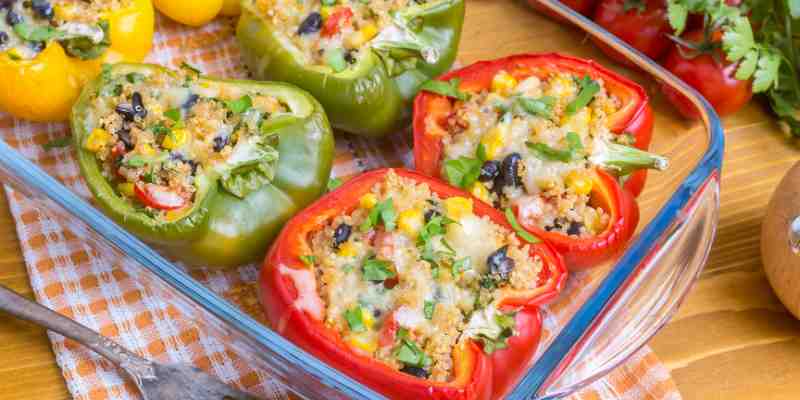
1. Quinoa and Black Bean Stuffed Peppers
Servings: 4
Ingredients:
- 4 large bell peppers
- 1 cup quinoa, rinsed
- 1 can (15 oz) black beans, drained and rinsed
- 1 cup corn kernels (fresh or frozen)
- 1 medium onion, diced
- 2 cloves garlic, minced
- 1 tsp cumin
- 1 tsp paprika
- Salt and pepper to taste
- 1 cup shredded cheddar cheese (optional)
- Fresh cilantro for garnish
Instructions:
- Prepare the Peppers: Preheat the oven to 375°F (190°C). Slice the tops off the bell peppers and remove the seeds and membranes. Place them in a baking dish.
- Cook Quinoa: In a medium saucepan, combine quinoa with 2 cups of water. Bring to a boil, then reduce heat, cover, and simmer for 15 minutes or until water is absorbed.
- Sauté Vegetables: In a large skillet, heat a bit of oil over medium heat. Add diced onion and cook until translucent. Add garlic, cumin, and paprika; cook for another minute.
- Combine Filling: Stir in cooked quinoa, black beans, and corn. Season with salt and pepper. Cook for 5 minutes, allowing flavors to meld.
- Stuff Peppers: Spoon the quinoa mixture into each bell pepper. If using cheese, sprinkle it on top.
- Bake: Cover the baking dish with foil and bake for 30 minutes. Remove the foil and bake an additional 10 minutes until peppers are tender and cheese is melted.
- Serve: Garnish with fresh cilantro and serve warm.
Protein per serving: Approximately 15 grams
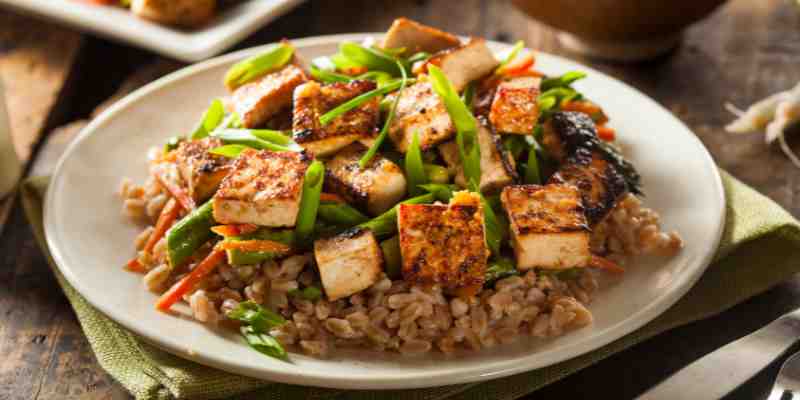
2. Lentil and Vegetable Stir-Fry
Servings: 4
Ingredients:
- 1 cup green or brown lentils
- 2 cups vegetable broth
- 1 tbsp olive oil
- 1 red bell pepper, sliced
- 1 yellow bell pepper, sliced
- 1 medium zucchini, sliced
- 1 cup broccoli florets
- 2 cloves garlic, minced
- 1 tbsp soy sauce
- 1 tsp grated ginger
- Salt and pepper to taste
- Cooked brown rice or quinoa for serving
Instructions:
- Cook Lentils: Rinse lentils under cold water. In a saucepan, combine lentils and vegetable broth. Bring to a boil, then reduce heat and simmer for 20-25 minutes until tender. Drain any excess liquid.
- Sauté Vegetables: In a large skillet or wok, heat olive oil over medium-high heat. Add garlic and ginger; sauté for 30 seconds until fragrant.
- Add Vegetables: Toss in bell peppers, zucchini, and broccoli. Stir-fry for 5–7 minutes until slightly tender but still crisp.
- Combine Ingredients: Add cooked lentils and soy sauce to the skillet. Stir well to combine and cook for another 3 minutes.
- Season & Serve: Season with salt and pepper to taste. Serve hot over cooked brown rice or quinoa.
Protein per serving: Approximately 18 grams
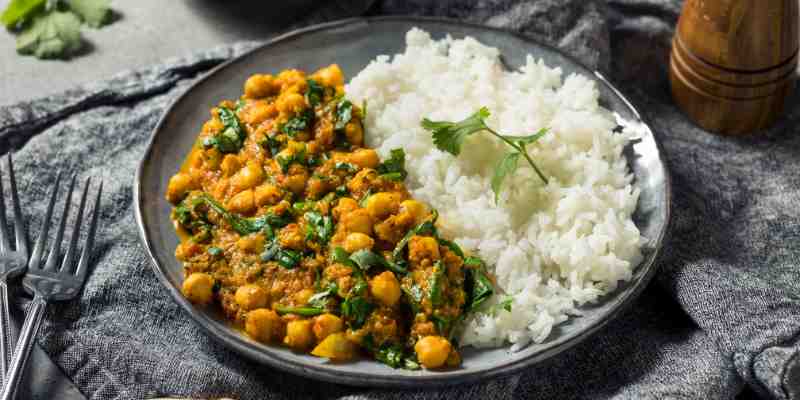
3. Chickpea and Spinach Curry
Servings: 4
Ingredients:
- 1 can (15 oz) chickpeas, drained and rinsed
- 1 tbsp olive oil
- 1 medium onion, chopped
- 2 cloves garlic, minced
- 1-inch piece ginger, grated
- 1 can (14 oz) diced tomatoes
- 1/2 cup coconut milk
- 2 cups fresh spinach
- 1 tsp turmeric
- 1 tsp cumin
- 1 tsp coriander
- 1/2 tsp chili powder
- Salt and pepper to taste
- Cooked basmati rice for serving
Instructions:
- Sauté Base: Heat oil in a large pan over medium heat. Add chopped onions and sauté until golden brown. Stir in garlic and ginger.
- Spices & Tomatoes: Add turmeric, cumin, coriander, and chili powder. Stir for 30 seconds before adding diced tomatoes. Cook for 5 minutes.
- Add Chickpeas & Coconut Milk: Stir in chickpeas and pour in coconut milk. Simmer for 10 minutes.
- Add Spinach: Stir in fresh spinach and cook until wilted. Season with salt and pepper.
- Serve: Serve hot over basmati rice.
Protein per serving: Approximately 16 grams
Explore 10 Quick Healthy Dinner Ideas….
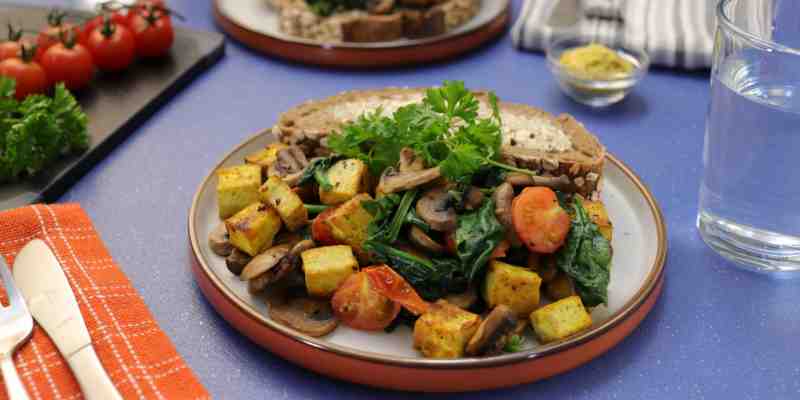
4. Tofu Scramble with Vegetables
Servings: 2
Ingredients:
- 1 block firm tofu, drained and crumbled
- 1 tbsp olive oil
- 1/2 red bell pepper, diced
- 1/2 yellow bell pepper, diced
- 1/2 zucchini, diced
- 1/2 onion, chopped
- 1/2 tsp turmeric
- 1/2 tsp garlic powder
- 1/4 tsp black salt (Kala Namak) for eggy flavor
- Salt and pepper to taste
- 1/2 tsp nutritional yeast (optional)
- Fresh parsley for garnish
Instructions:
- Sauté Vegetables: Heat olive oil in a pan over medium heat. Add onion and cook until soft. Add bell peppers and zucchini. Cook for 3–4 minutes.
- Add Tofu & Spices: Crumble tofu into the pan. Sprinkle turmeric, garlic powder, black salt, and nutritional yeast. Mix well.
- Cook & Serve: Cook for 5–7 minutes until heated through. Garnish with fresh parsley.
Protein per serving: Approximately 20 grams
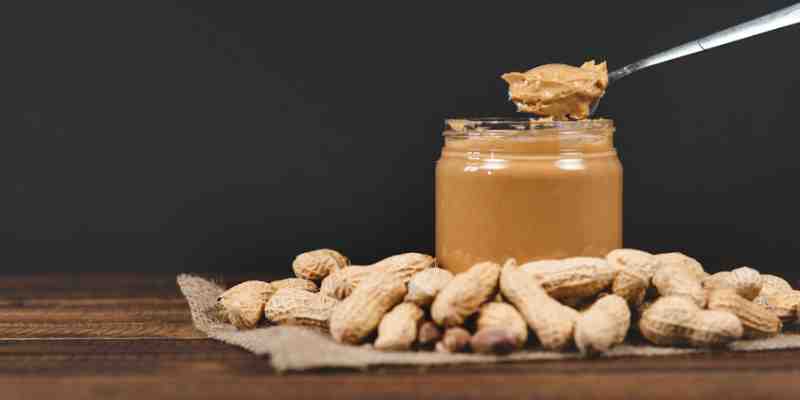
5. Peanut Butter and Banana Smoothie
Servings: 1
Ingredients:
- 1 banana
- 1 cup almond milk
- 2 tbsp peanut butter
- 1 tbsp chia seeds
- 1 scoop vanilla protein powder (optional)
- 1/2 tsp cinnamon
Instructions:
- Blend: Add all ingredients to a blender. Blend until smooth.
- Serve: Pour into a glass and enjoy!
Protein per serving: Approximately 22 grams
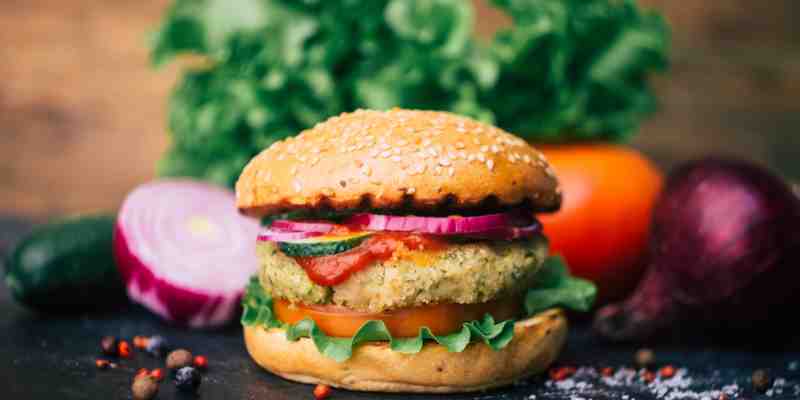
6. High-Protein Veggie Burger
Servings: 4
Ingredients:
- 1 can (15 oz) black beans, drained and rinsed
- 1/2 cup cooked quinoa
- 1/4 cup ground flaxseeds
- 1/2 onion, finely chopped
- 2 cloves garlic, minced
- 1 tsp smoked paprika
- 1/2 tsp cumin
- 1/2 tsp salt
- 1 tbsp olive oil
- Whole wheat buns for serving
Instructions:
- Mash Beans: In a bowl, mash black beans with a fork.
- Combine Ingredients: Mix in quinoa, flaxseeds, onion, garlic, and spices. Form patties.
- Cook Patties: Heat oil in a pan over medium heat. Cook patties for 4 minutes per side until crispy.
- Serve: Serve on whole wheat buns with desired toppings.
Protein per serving: Approximately 18 grams
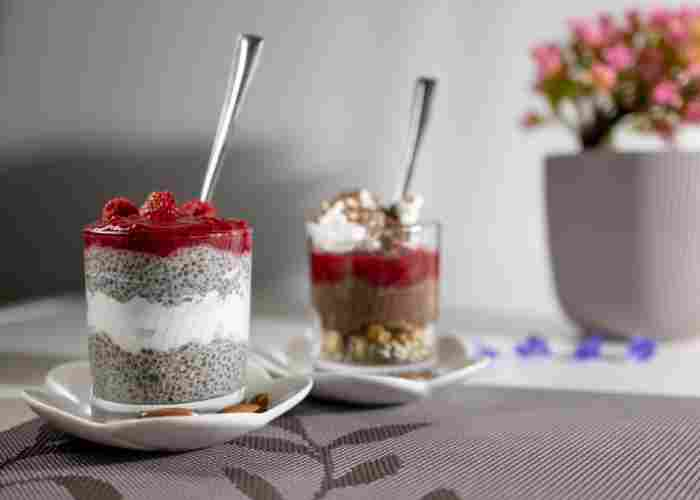
7. Greek Yogurt and Chia Pudding
Servings: 2
Ingredients:
- 1 cup Greek yogurt
- 2 tbsp chia seeds
- 1/2 cup almond milk
- 1 tbsp honey
- 1/2 tsp vanilla extract
- 1/2 cup mixed berries
Instructions:
- Mix Ingredients: In a bowl, whisk together Greek yogurt, chia seeds, almond milk, honey, and vanilla extract.
- Chill: Cover and refrigerate for at least 2 hours or overnight.
- Serve: Top with mixed berries and enjoy!
Protein per serving: Approximately 22 grams
Table: High-Protein Vegetarian Recipes
| Recipe | Protein per Serving | Prep Time | Difficulty Level | Key Ingredients |
| Quinoa and Black Bean Bowl | 22g | 20 mins | Easy | Quinoa, black beans, avocado, corn |
| Lentil and Vegetable Stir-Fry | 18g | 25 mins | Medium | Lentils, bell peppers, zucchini, broccoli |
| Chickpea and Spinach Curry | 16g | 30 mins | Medium | Chickpeas, spinach, tomatoes, coconut milk |
| Tofu Scramble with Vegetables | 20g | 15 mins | Easy | Tofu, bell peppers, turmeric, black salt |
| Peanut Butter and Banana Smoothie | 22g | 5 mins | Very Easy | Peanut butter, banana, almond milk, chia seeds |
| High-Protein Veggie Burger | 18g | 35 mins | Medium | Black beans, quinoa, flaxseeds, onion |
| Greek Yogurt and Chia Pudding | 22g | 2+ hours (chilling) | Easy | Greek yogurt, chia seeds, almond milk, mixed berries |
Top 5 Books on Vegetarian Cooking
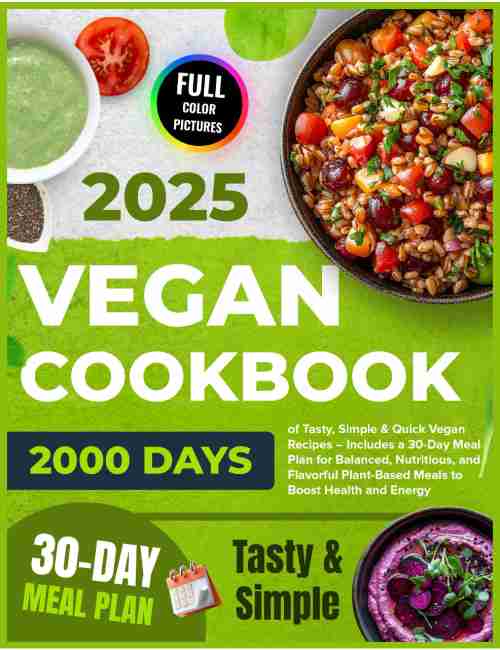
1. Vegan Cookbook
Vegan Cookbook: 2000 Days of Tasty, Simple & Quick Vegan Recipes by Julianna Wiggins offers 114 plant-based recipes, all egg-free, cheese-free, gluten-free, and dairy-free (4.4/5 stars on Amazon). It includes a 30-day meal plan, shopping list, and vibrant color photos. Perfect for beginners, it ensures a balanced and nutritious diet with easy-to-follow instructions.
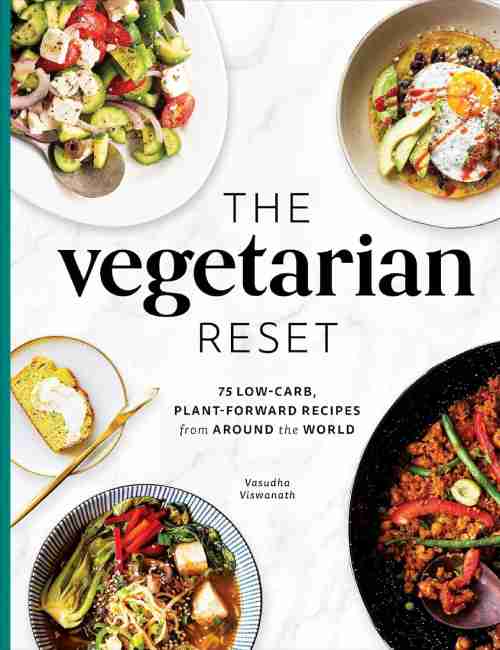
2. The Vegetarian Reset
“The Vegetarian Reset” by Vasudha Viswanath is a cookbook with 75 low-carb, plant-forward recipes from around the world. It focuses on healthy, flavorful dishes using vegetables, legumes, and healthy fats, while being gluten-free. Rated 4.6 out of 5 stars (112 ratings on Amazon), it offers creative, easy-to-follow recipes that will inspire vegetarians and omnivores alike to eat better and feel nourished.
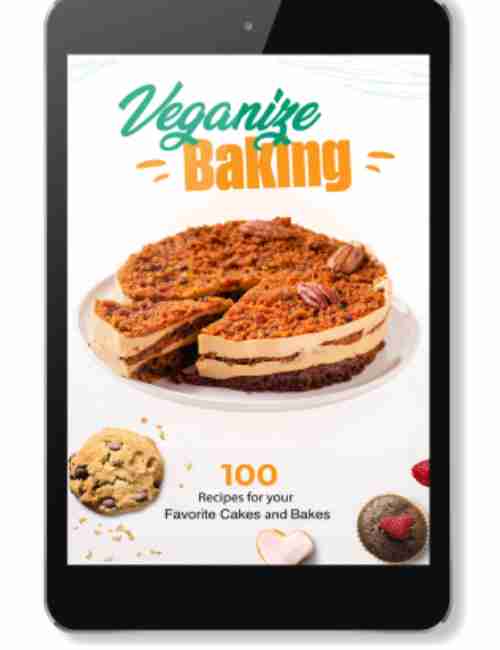
3. Veganize Baking Cookbook
The Veganize Baking E-book is a comprehensive guide for anyone wanting to bake delicious vegan treats. It offers a variety of recipes, from simple cookies to cakes and breads, all designed to be easy to follow. The book also provides helpful tips on ingredient substitutions and vegan baking techniques, making it suitable for both beginners and experienced bakers.
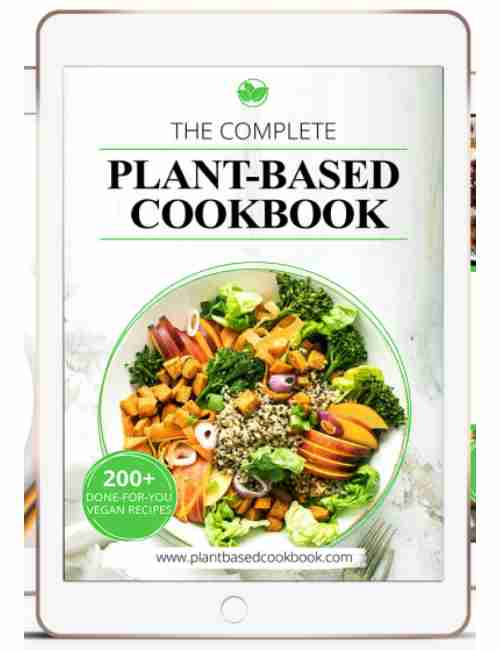
4. Plant-Based Cookbook
The Plant-Based Cookbook is an excellent guide for anyone looking to embrace a healthy, plant-based diet. With over 200 recipes, a 30-day meal plan, and bonus features like a grocery shopping list and smoothie recipes, it offers everything you need to start your journey. The recipes are quick and easy, making them ideal for people with busy lifestyles.
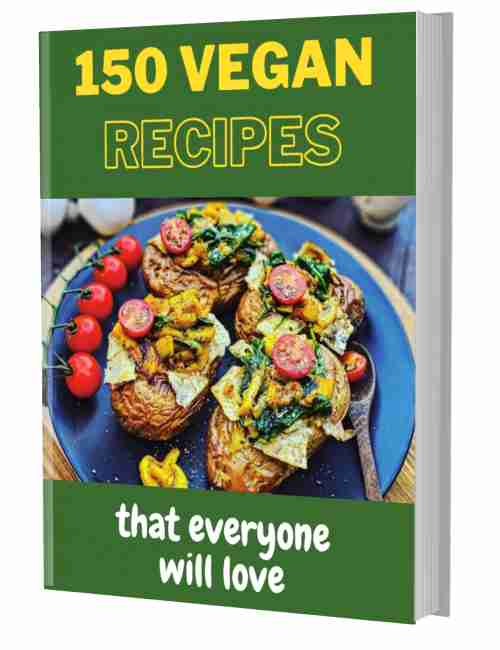
5. 300 Vegan/Plant-Based Recipes
The 300 Vegan/Plant-Based Recipe Cookbook is a comprehensive guide to plant-based eating. It features 300 versatile recipes designed for various occasions, from quick snacks to festive meals. This cookbook prioritizes simplicity with easy-to-follow instructions and common ingredients. Its user-friendly digital format ensures accessibility across devices. Bonuses like the vegan grocery list and additional recipe books for sandwiches and salads provide added value.
